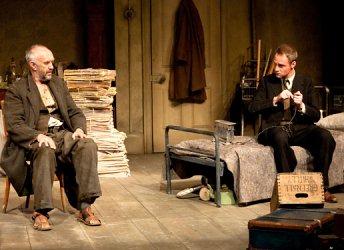The Caretaker Review 2010
Nothing much really happens in 'The Caretaker'. There's no complex plot with surprising shifts, tantalising twists or skeletons that leap out of cupboards. What actually happens is that a man called Aston brings an older man, Davies, back to his room in a house owned by his brother, Mick. Aston allows the older man - who seems to be homeless - to stay in his room. As time progresses, Aston and Mick ask Davies to be the caretaker at the house, but things don't seem to work out as planned.
Given electro-shock treatment when younger, Aston is wary of people. Like the other two characters in the play, he's a dreamer. All he wants to do is to build his shed - a workshop - in the garden and everything will be fine. But we know he's never going to get it finished, just as we know that Davies is never going to get down to Sidcup to get his references and other personal documents to reclaim his life. And Mick is no more likely to convert the flat into a stylish penthouse with swish fittings than he is to become Prime Minister. All the characters in this play are failures, but manage to scrape through life nonetheless.
'The Caretaker' has been analysed to death by academics intent on finding deeper meanings below the grimy veneer of the dishevelled house where the action takes place. But Pinter's description of the play was simpler: 'It's about two brothers and a caretaker'. Taken at face value, 'The Caretaker' captures real, ordinary people simply interacting with each other. So what is it that makes this one of the twentieth century's most significant and important plays? It's certainly because of its simplicity, but it's also about Pinter's extraordinary use of language. The characters talk in 'real' language not artificial stage talk. Unfinished sentences, repetition and odd-sounding phrases are all part of the Pinter dialogue package. That said, it's not quite as simple as that because Pinter employs a kind of poetic style that makes it much more than it seems.
In this version, Jonathan Pryce is a fox-like Davies who thinks he's cunning and sly, but is not sufficiently so to recognise which brother it is best to side with. Pryce interweaves a number of facets into this gem of a performance. For example, he pokes and points at the other two characters - from a safe distance - and uses the same pointing action as a means of emphasis and self-expression. Overall, Pryce has really got under the skin and into the bones of Davies, to produce a hugely compelling performance.
The brothers are both well-defined and distinctive. Peter McDonald is the withdrawn Aston who puts his trust in the wrong people. But when he delivers his long soliloquy about being given electro-shock therapy, he brings us near to tears - not just because of his description but in the almost matter of fact way in which he delivers it. A very moving and poignant passage in the play. On the other hand, Sam Spruell as the second brother, Mick, embodies simmering violence. He convinces us that, if we were to say something even slightly inappropriate, we would be on the wrong end of a raging inferno. But it never gets to that pitch because the violence - apart from when Mick and Davies first meet - is controlled.
Pinter's work - particularly his earlier work - is very funny and there's plenty of humour in 'The Caretaker'. Personally though, I prefer 'The Birthday Party' and 'The Homecoming' which I think have more humour. But in Pinter's plays, there always comes a point when the humour ends as we begin to realise just what lies within the characters.
In spite of the simplicity of the plot, 'The Caretaker' is gripping from beginning to end, and this is a very fine, faithfully realised revival which really is a 'must see'.
"Near-flawless production."
Rhoda Koenig for The Independent
"Pinter's great play is still as shocking and fresh as it was in 1960."
Lyn Gardner for The Guardian
"He's [Jonathan Pryce's Davies] also mean yet oddly jovial, ferociously aggressive yet, at the end, pitiable in his loneliness. Is there a more complete performance on offer in London? Can't think of one."
Benedict Nightingale for The Times
"Forty years on it seems perhaps too familiar, despite a gripping production by Christopher Morahan and a superb cast headed by Jonathan Pryce as the disgusting old tramp, Davies."
Charles Spencer for The Daily Telegraph
"This production, anchored by Pryce's multifaceted performance, potently communicates the simple menace of Pinter's writing."
Henry Hitchings's for The Evening Standard
External links to full reviews from popular press
Times - Telegraph - Independent - Guardian
Originally published on
